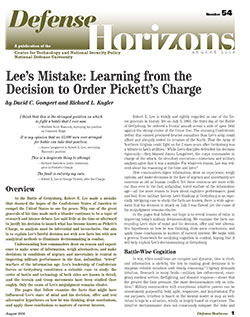DOWNLOAD PDF
 Overview
Overview
At the Battle of Gettysburg, Robert E. Lee made a mistake that doomed the hopes of the Confederate States of America to compel the United States to sue for peace. Why one of the great generals of his time made such a blunder continues to be a topic of research and intense debate. Lee said little at the time or afterward to justify his decision to launch what has become known as Pickett’s Charge, so analysis must be inferential and inconclusive. Our aim is to explain Lee’s fateful decision not with new facts but with new analytical methods to illuminate decisionmaking in combat.
Understanding how commanders draw on reason and experience to make sense of information, weigh alternatives, and make decisions in conditions of urgency and uncertainty is central to improving military performance in the fast, unfamiliar, “wired” warfare of the information age. Lee’s leadership of Confederate forces at Gettysburg constitutes a valuable case to study: the order of battle and technology of both sides are known in detail, and the terrain and troop movements have been studied thoroughly. Only the cause of Lee’s misjudgment remains elusive.
The pages that follow examine the facts that might have influenced Lee’s state of mind and his decision, offer and test alternative hypotheses on how he was thinking, draw conclusions, and apply those conclusions to matters of current interest.
READ MORE >>